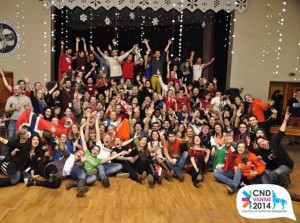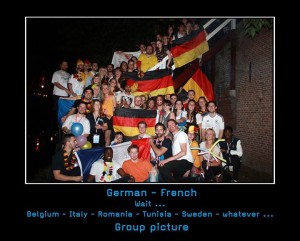Getting more into participant observation
Recently I had the chance to attend another ESN event, a pretty important one actually. It was the Council of National Delegates in Vilnius. This time I wanted to get more into observing the people I interact with, to observe patterns of language and behaviour, which I have to say, was more difficult than I would have ever imagined.
I am always quite happy and proud to say that I am part of this multicultural environment, that I work with young, motivated people, but it does get exhausting sometimes. Especially when you are sort of trying to have an outside perspective on everything. The event was tough. The plenaries lasted more than usual, as people were discussing future strategies of the network and the new budget. It got very political, very specific and quite heated at some points. I guess it was one of those moments where you could see the sub-groups of the big group more pregnant than before, by which I mean countries taking a stand for their own interests and so on. But only in plenaries.
No matter the differences within the meeting, outside of it there was no mentioning of them, there were no hard feelings and the differences just seemed minimised when we all got back to our hostel rooms, staying more than four or five together in the same room or discussing over a drink or two while exploring a new city. It is therefore very difficult for me to identify sameness/difference. As any researcher pursuing the question of identity, whether I am addressing a European identity or the organisational identity, I am trying to identify patterns of “inside/outside”, but things are just not quite clear-cut in this case. It does honestly feel like a group of friends who happen to do politics together. Of course, a group with a vast amount of knowledge and who have been voted to get there through very thorough and constant processes, so yes, quite an exclusive group.
But then again going to the question of European identity, I observed a very interesting pattern. Countries with historical background seem to stick together or stick up for each other. For instance, I have noticed that ESN Cyprus always votes the same as ESN Greece, same with the Czech Republic and Slovakia. That paradoxically, Germany and France have a very close partnership/friendship going on and organise projects together. If I think about it, when Greece ran against Turkey for organising the Annual General Meeting in 2015, the defeat for Greece was even more tough as it was against Turkey.The Nordics always organise projects altogether, but that might also be a case of geographical vicinity. We are all friends, most of us consider ourselves to be Europeans, but it’s quite interesting to see how in terms of projects and decisions, nationality and culture does signify more, at least that’s what I noticed.
There are some exceptions though. As a member of ESN UK, I don’t think there are strong connections or similarities between ESN UK and ESN Ireland, but I am not sure to what extent that is relevant. And there are also random friendships forming, such as Italy and Poland, who are organising ESN Olympics every year with Erasmus students from both countries.
These are just a few things I observed and I think might be helpful in my further research. I need to go more in-depth with everything though, and I need to focus a little bit on language use as well. But more about language in the next post.




Leave a Reply